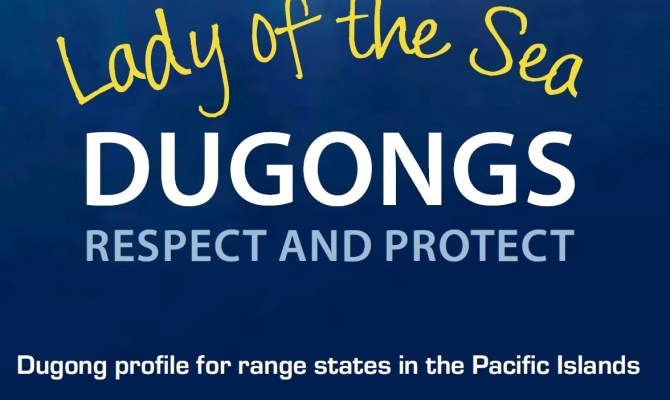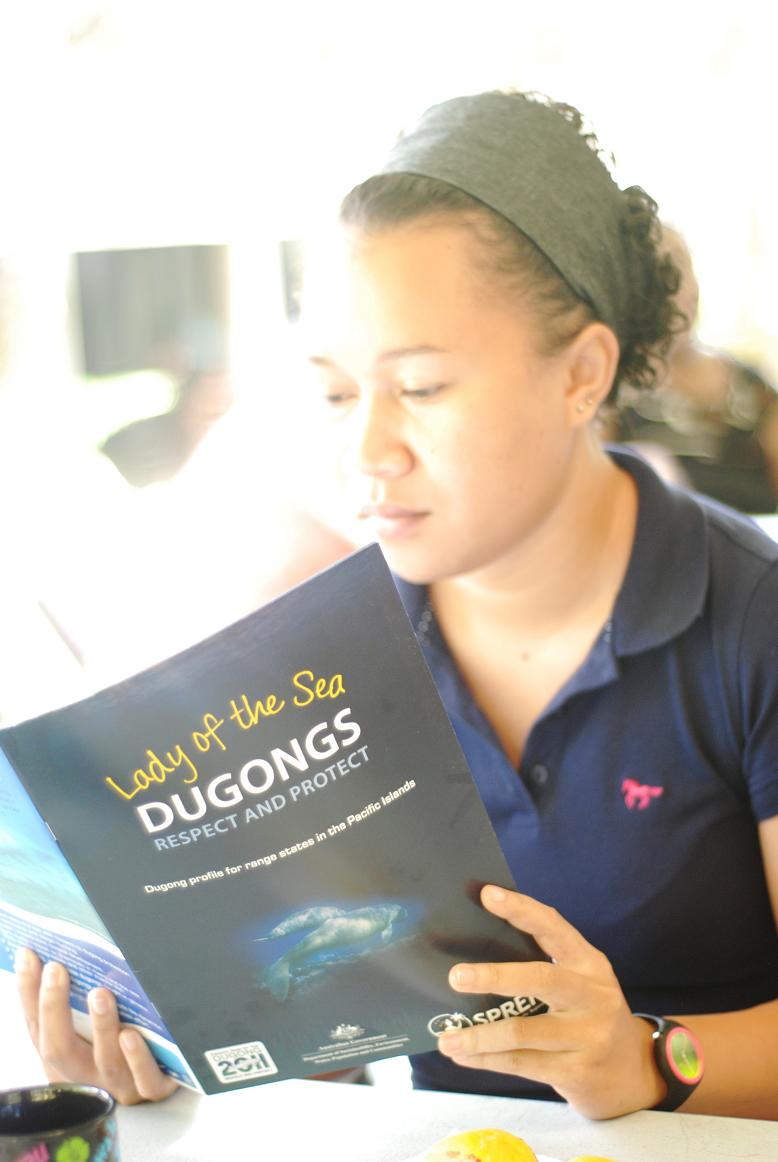
Island and Ocean Ecosystems
14 August, 2014, Nadi, Fiji - Vanuatu and the Solomon Islands are part of a USD 6 million dollar project spanning five years, to conserve dugongs and seagrass across the Indian and Pacific Ocean basins.
This was announced at the Pacific Joint Preparatory Meeting to the Convention of Biological Diversity COP12, Convention on Migratory Species COP 11 and Ramsar COP 12 underway in Nadi, Fiji this week.
Endorsed last month, this ambitious undertaking will be led by the United Nations Environment Programme (UNEP) CMS Dugong MOU Secretariat and is funded by the Global Environment Facility. The programme will support 40 projects to enhance the effectiveness of conservation of dugongs and the seagrass ecosystems on which they depend.

The Convention on Migratory Species aims to conserve terrestrial, aquatic and avian migratory species throughout their range. It currently has seven parties from the Oceania Region with Fiji being the newest parties.
""Dugongs are friendly animals and they play an important role in our traditional cultures, they are featured in oral stories and songs that have been passed down," said Mr. Trinison Tarivonda the Senior Education and Information Officer for the Department of Environmental Protection and Conservation of Vanuatu.
"In our country people respect them, and they are fully protected."
In 2010 in the Solomon Islands a questionnaire-based survey of dugong distribution and abundance was carried out consisting of 98 interviews were conducted at 24 locations.
The key results showed 300 dugongs were reported, comprising of 248 adults and 52 calves. Over a ten-year period, 742 dugongs were recorded but there is no recorded trend.
Of concern was the finding that a total of 56 dugongs were reported stranded from nets from both accidental and intentional netting.
"Through the survey, we know there is still much more information needed about the abundance, status and trends of dugongs in the Solomon Islands. We do know however that dugongs form part of the main diet for some parts of the country, especially for special cultural feasts. They are also highly respected in other parts and are featured in traditional cultural tales of Solomon Islanders," said Ms. Rose Babaua, the Senior Conservation Officer for the Ministry of Environment, Climate Change, Disaster Management and Meteorology of the Solomon Islands.
"We also learnt from the survey about how special and vulnerable these animals are. Dugongs are highly territorial, they lay claim to their own areas that include their habitats and feeding ground. We now know that more conservation measures need to be adopted to protect our dugongs. There can never be enough done to protect and conserve these creatures."
The Memorandum of Understanding on the Conservation and Management of Dugongs and their habitats throughout their range entered into effect through CMS in 2007. The MoU aims to promote internationally coordinated actions to ensure the long-term survival of dugongs and their seagrass habitats throughout their extensive range.

Also known as the sea cow, the dugong is the only herbivorous marine mammal. While Australia has the largest global population, it is also found in the Pacific islands of New Caledonia, Palau, Papua New Guinea, Solomon Islands and Vanuatu, all of which are signatories to the MoU on the conservation and management of Dugongs and their habitats.
"It's an indication of environmental leadership that all Pacific dugong range states signed on to this MoU within three years of its coming into effect. That has been taken a step further through national initiatives such as Palau whose marine sanctuary specifically includes dugongs," said Ms. Penina Solomona, the Pacific CMS Officer for the Secretariat of the Pacific Regional Environment Programme (SPREP).
"The upcoming national efforts and projects in the Solomon Islands and Vanuatu will be a positive step toward the conservation of these creatures, which face many threats and challenges."
Dugongs grow slowly, mature late and have lengthy reproductive cycles, which makes them highly vulnerable to both chronic and acute threats. Additionally dugongs feed exclusively on seagrasses, which are restricted to shallow coastal waters and are frequently the target of industrial developments or pollution.
These marine mammals are classified as "vulnerable to extinction" on the International Union for Conservation of Nature's (IUCN) Red List of Threatened Species, indicating that there is a high-risk of extinction.
For more information on the country profiles of the Dugong in any of the Pacific range.
The Pacific Joint Preparatory Meeting to the Convention of Biological Diversity COP12, Convention on Migratory Species COP 11 and Ramsar COP 12 is held in Nadi, Fiji from 11 to 15 August.
Countries represented at the one week conference are the Cook Islands, Fiji, Federated States of Micronesia, Kiribati, Marshall Islands, Nauru, New Zealand, Palau, Papua New Guinea, Samoa, Solomon Islands, Tokelau, Tuvalu and Vanuatu. Partners and stakeholders from the Pacific Islands Forum Secretariat, United Nations Development Program, WWF Pacific, UNEP, CBD, CMS, Convention on International Trade on Endangered Species (CITES).
This was announced at the Pacific Joint Preparatory Meeting to the Convention of Biological Diversity COP12, Convention on Migratory Species COP 11 and Ramsar COP 12 underway in Nadi, Fiji this week.
Endorsed last month, this ambitious undertaking will be led by the United Nations Environment Programme (UNEP) CMS Dugong MOU Secretariat and is funded by the Global Environment Facility. The programme will support 40 projects to enhance the effectiveness of conservation of dugongs and the seagrass ecosystems on which they depend.

The Convention on Migratory Species aims to conserve terrestrial, aquatic and avian migratory species throughout their range. It currently has seven parties from the Oceania Region with Fiji being the newest parties.
""Dugongs are friendly animals and they play an important role in our traditional cultures, they are featured in oral stories and songs that have been passed down," said Mr. Trinison Tarivonda the Senior Education and Information Officer for the Department of Environmental Protection and Conservation of Vanuatu.
"In our country people respect them, and they are fully protected."
In 2010 in the Solomon Islands a questionnaire-based survey of dugong distribution and abundance was carried out consisting of 98 interviews were conducted at 24 locations.
The key results showed 300 dugongs were reported, comprising of 248 adults and 52 calves. Over a ten-year period, 742 dugongs were recorded but there is no recorded trend.
Of concern was the finding that a total of 56 dugongs were reported stranded from nets from both accidental and intentional netting.
"Through the survey, we know there is still much more information needed about the abundance, status and trends of dugongs in the Solomon Islands. We do know however that dugongs form part of the main diet for some parts of the country, especially for special cultural feasts. They are also highly respected in other parts and are featured in traditional cultural tales of Solomon Islanders," said Ms. Rose Babaua, the Senior Conservation Officer for the Ministry of Environment, Climate Change, Disaster Management and Meteorology of the Solomon Islands.
"We also learnt from the survey about how special and vulnerable these animals are. Dugongs are highly territorial, they lay claim to their own areas that include their habitats and feeding ground. We now know that more conservation measures need to be adopted to protect our dugongs. There can never be enough done to protect and conserve these creatures."
The Memorandum of Understanding on the Conservation and Management of Dugongs and their habitats throughout their range entered into effect through CMS in 2007. The MoU aims to promote internationally coordinated actions to ensure the long-term survival of dugongs and their seagrass habitats throughout their extensive range.

Also known as the sea cow, the dugong is the only herbivorous marine mammal. While Australia has the largest global population, it is also found in the Pacific islands of New Caledonia, Palau, Papua New Guinea, Solomon Islands and Vanuatu, all of which are signatories to the MoU on the conservation and management of Dugongs and their habitats.
"It's an indication of environmental leadership that all Pacific dugong range states signed on to this MoU within three years of its coming into effect. That has been taken a step further through national initiatives such as Palau whose marine sanctuary specifically includes dugongs," said Ms. Penina Solomona, the Pacific CMS Officer for the Secretariat of the Pacific Regional Environment Programme (SPREP).
"The upcoming national efforts and projects in the Solomon Islands and Vanuatu will be a positive step toward the conservation of these creatures, which face many threats and challenges."
Dugongs grow slowly, mature late and have lengthy reproductive cycles, which makes them highly vulnerable to both chronic and acute threats. Additionally dugongs feed exclusively on seagrasses, which are restricted to shallow coastal waters and are frequently the target of industrial developments or pollution.
These marine mammals are classified as "vulnerable to extinction" on the International Union for Conservation of Nature's (IUCN) Red List of Threatened Species, indicating that there is a high-risk of extinction.
For more information on the country profiles of the Dugong in any of the Pacific range.
The Pacific Joint Preparatory Meeting to the Convention of Biological Diversity COP12, Convention on Migratory Species COP 11 and Ramsar COP 12 is held in Nadi, Fiji from 11 to 15 August.
Countries represented at the one week conference are the Cook Islands, Fiji, Federated States of Micronesia, Kiribati, Marshall Islands, Nauru, New Zealand, Palau, Papua New Guinea, Samoa, Solomon Islands, Tokelau, Tuvalu and Vanuatu. Partners and stakeholders from the Pacific Islands Forum Secretariat, United Nations Development Program, WWF Pacific, UNEP, CBD, CMS, Convention on International Trade on Endangered Species (CITES).